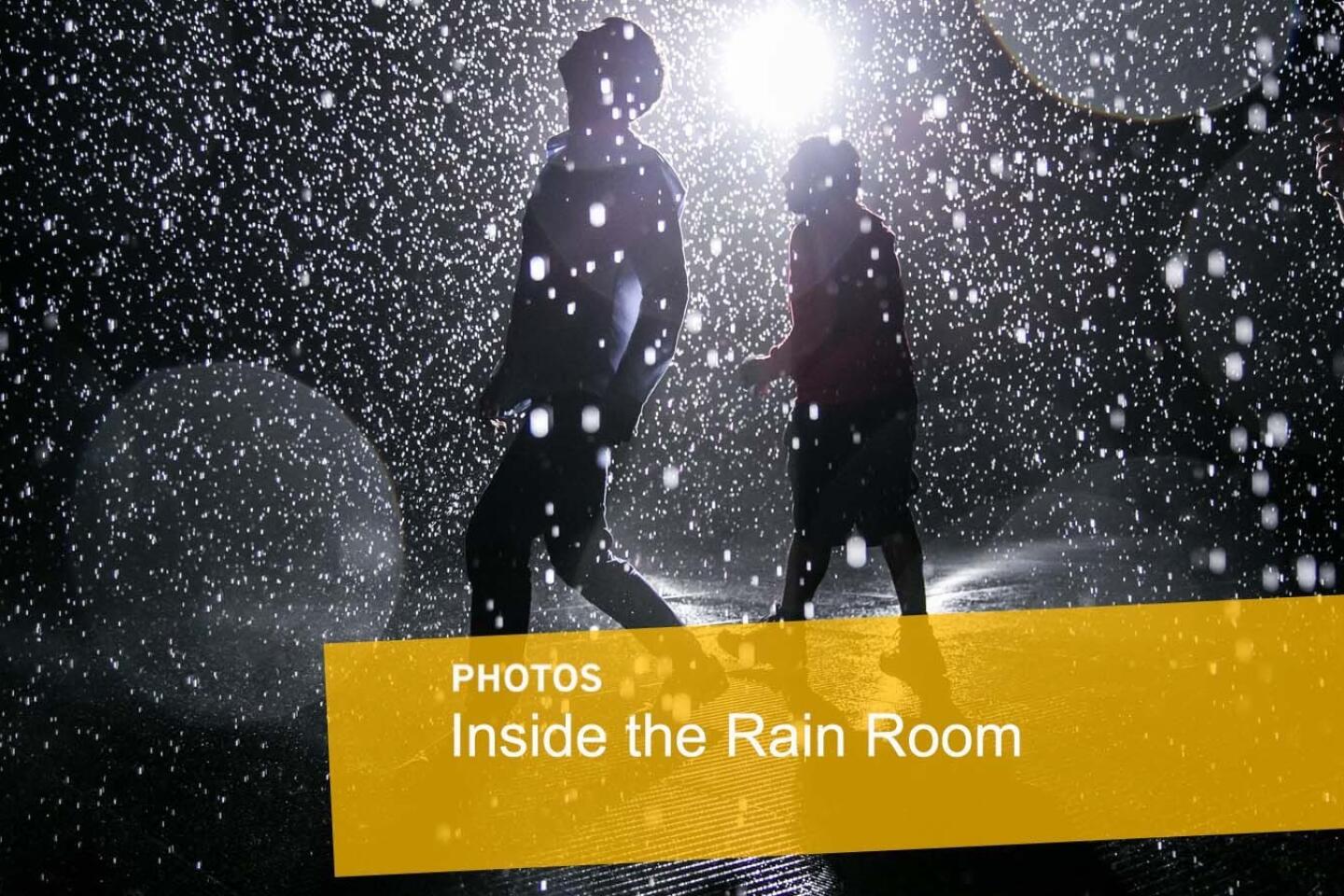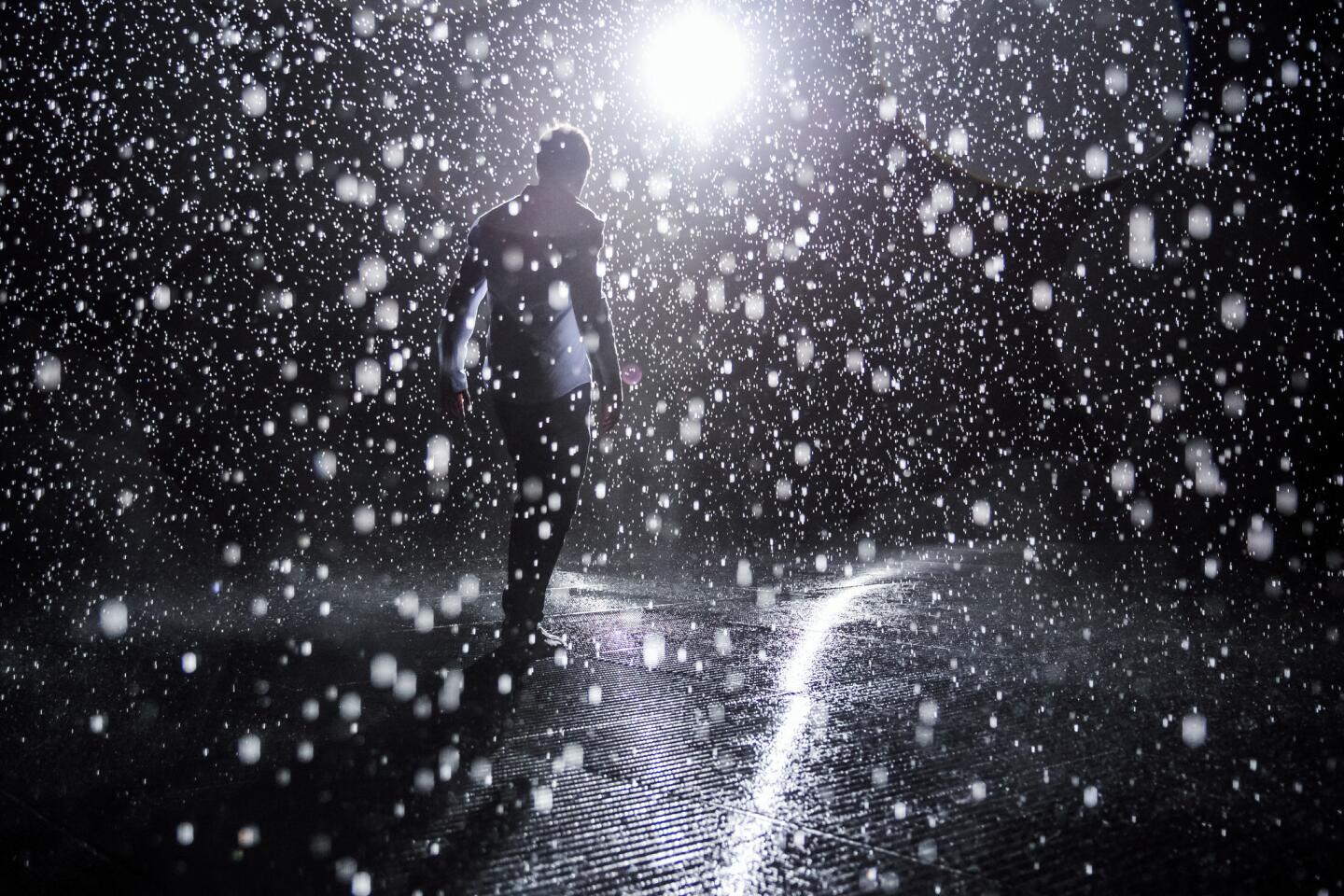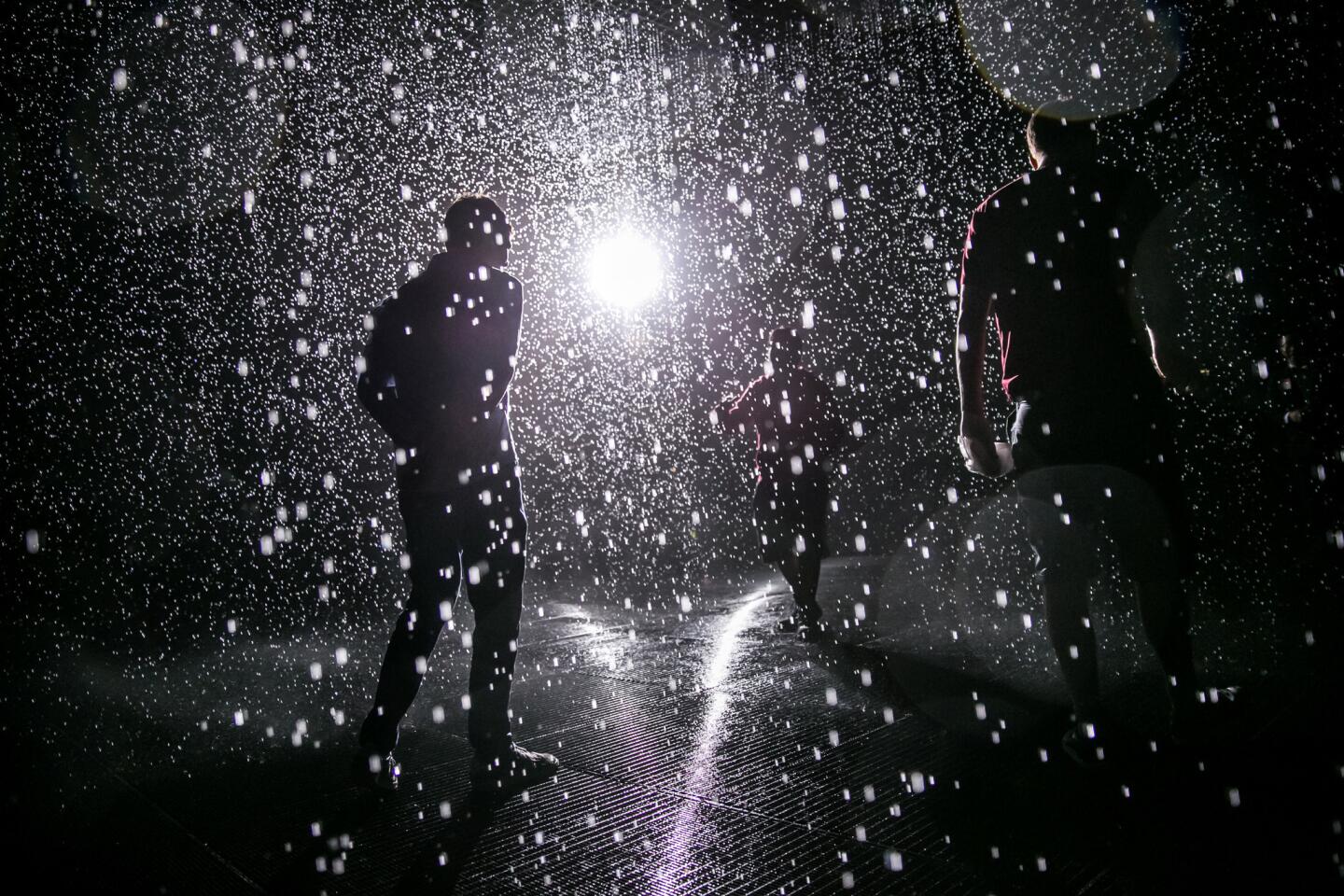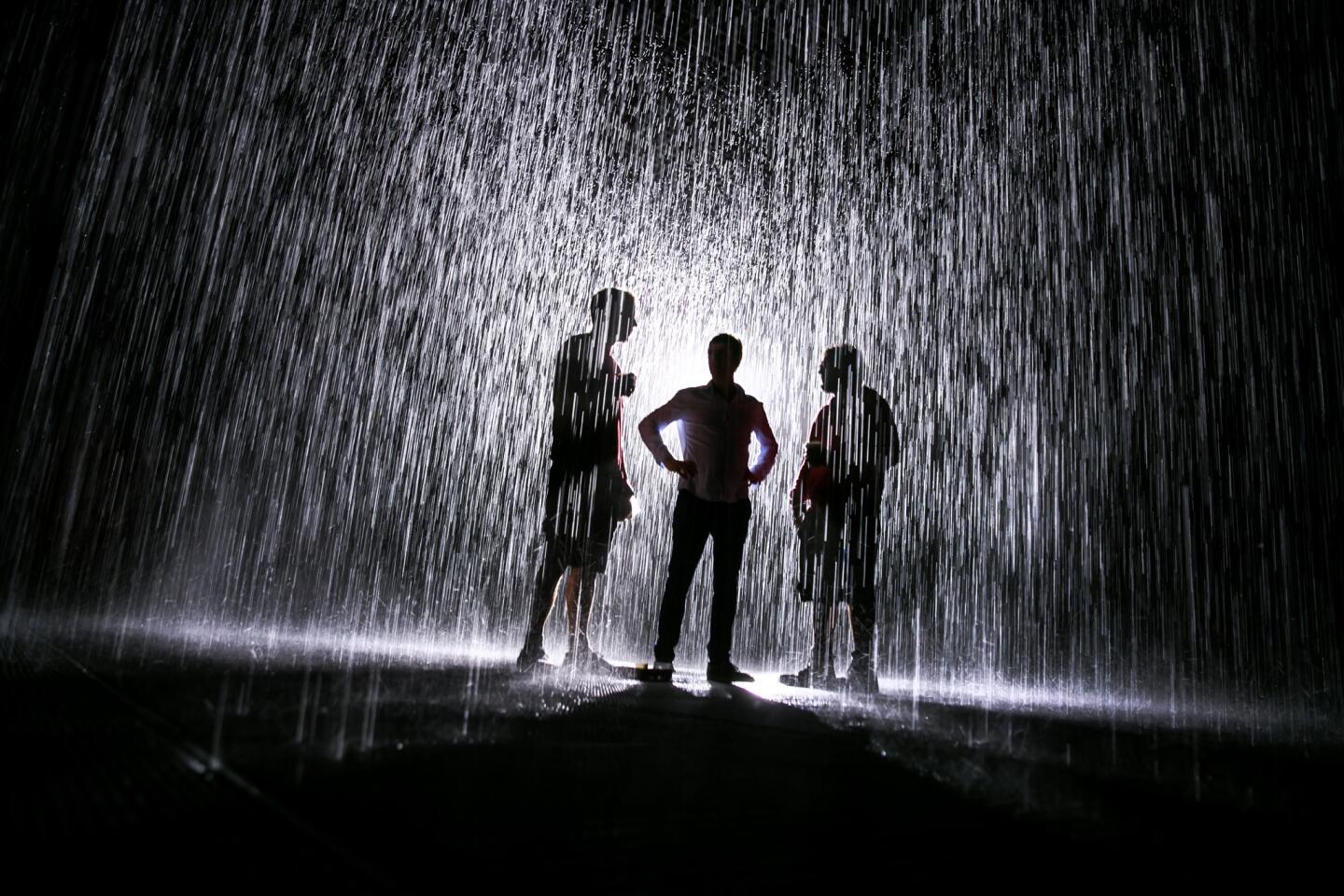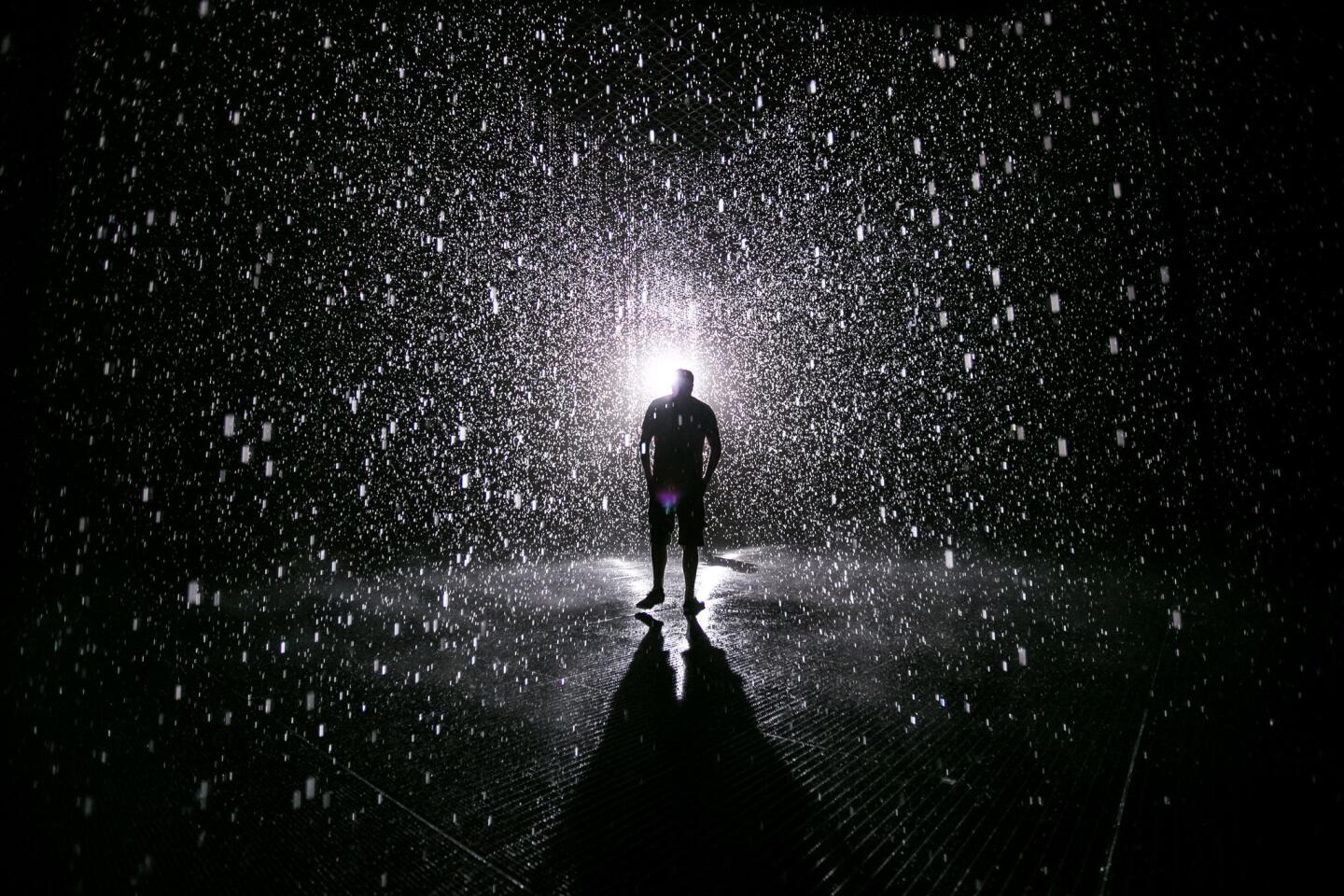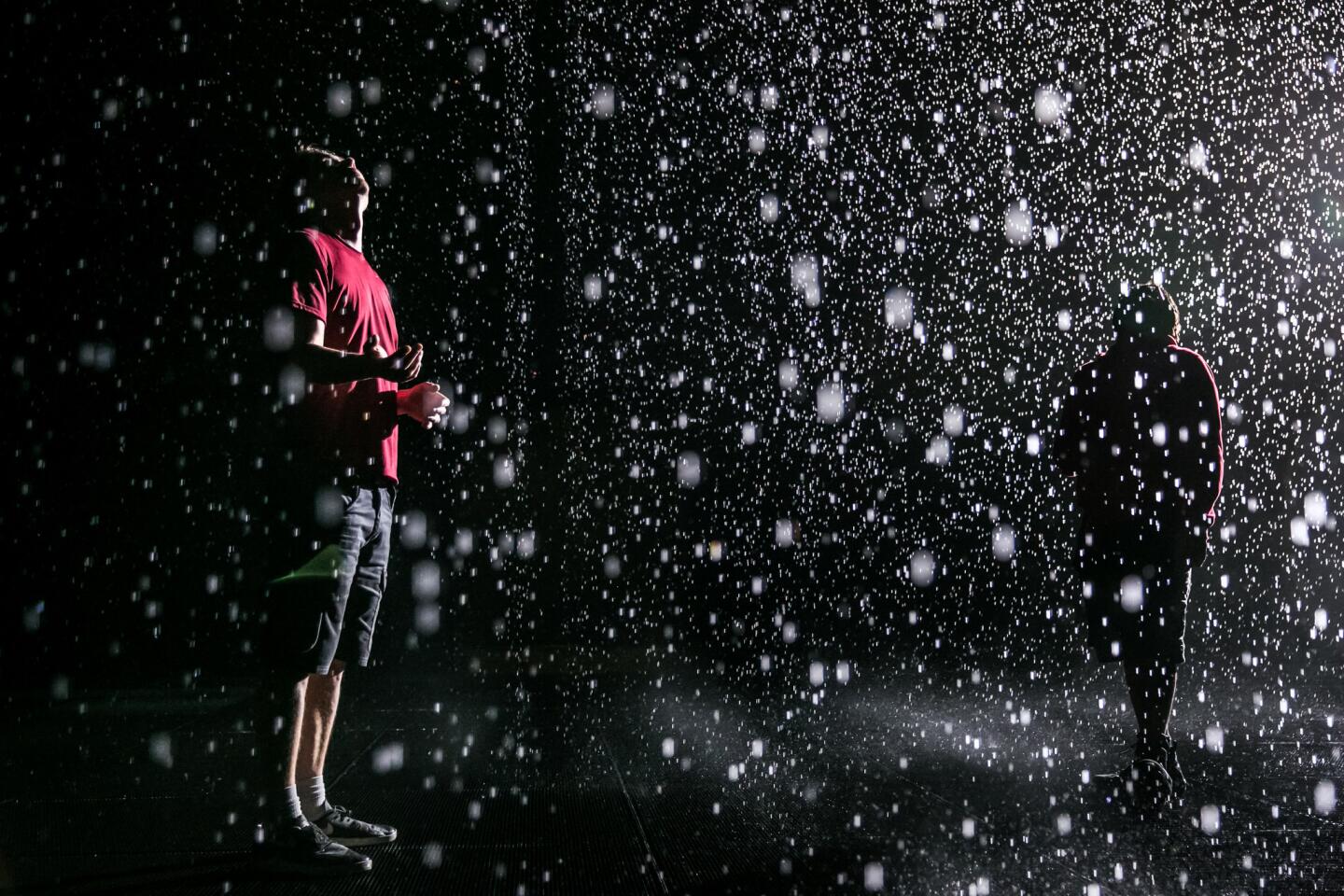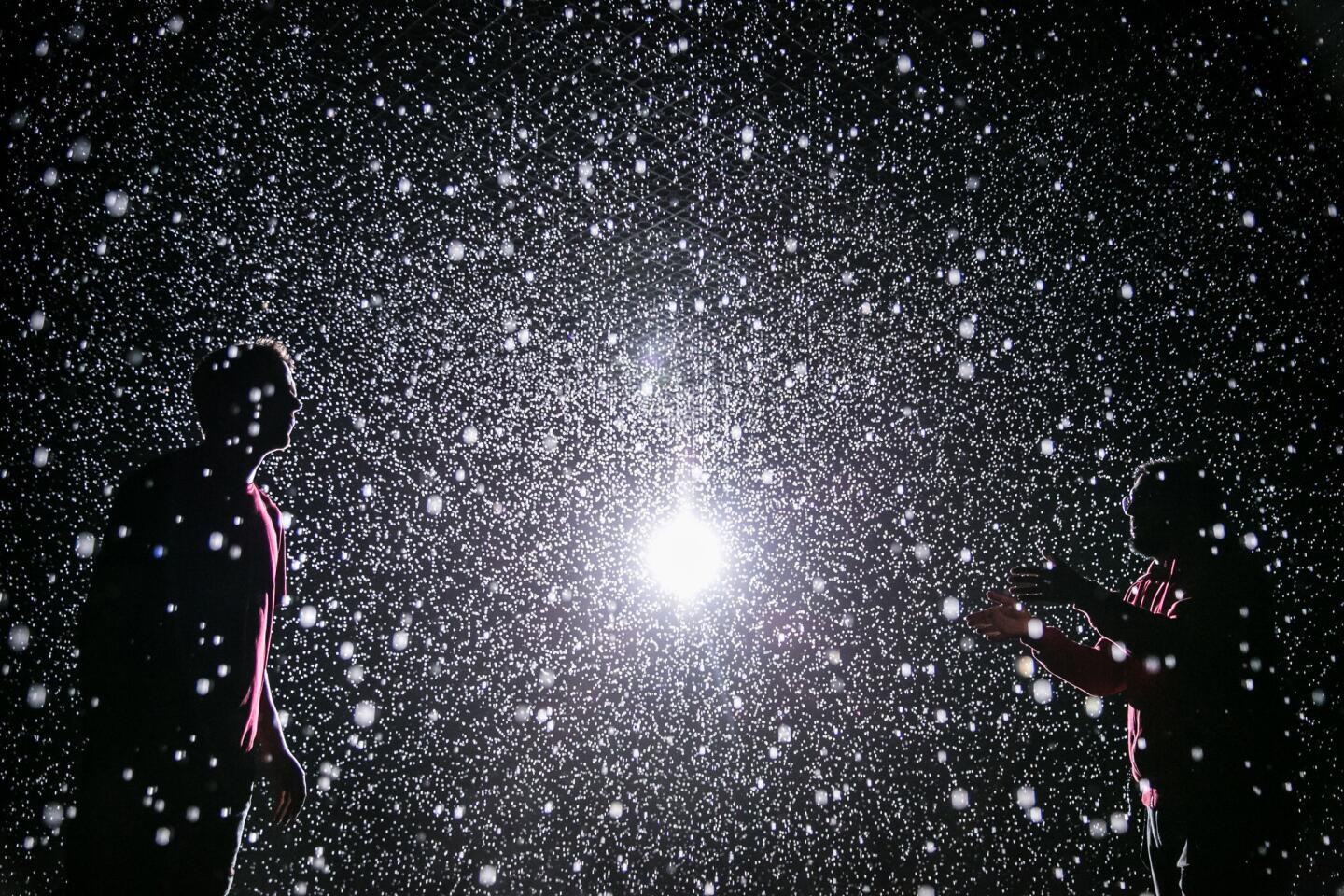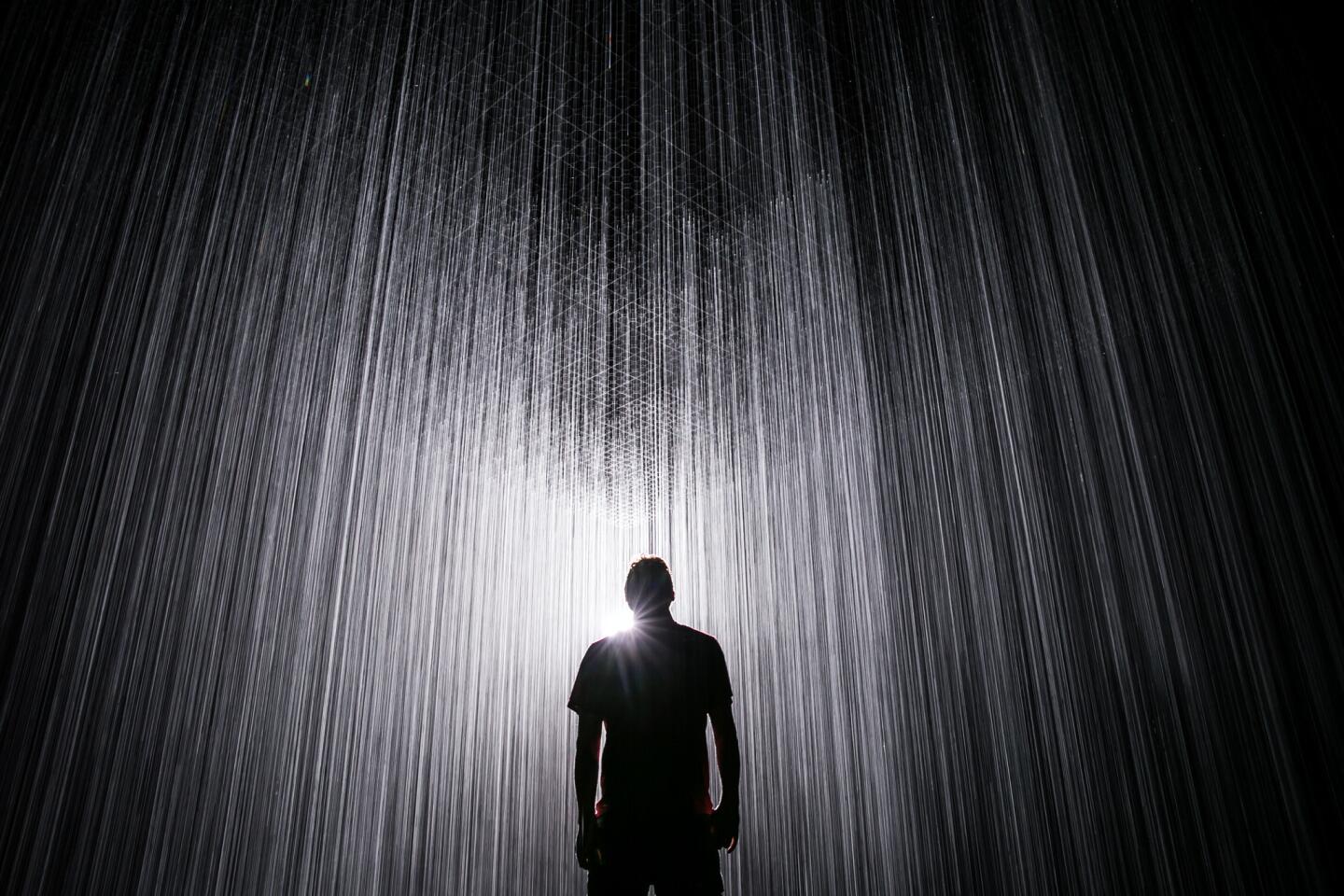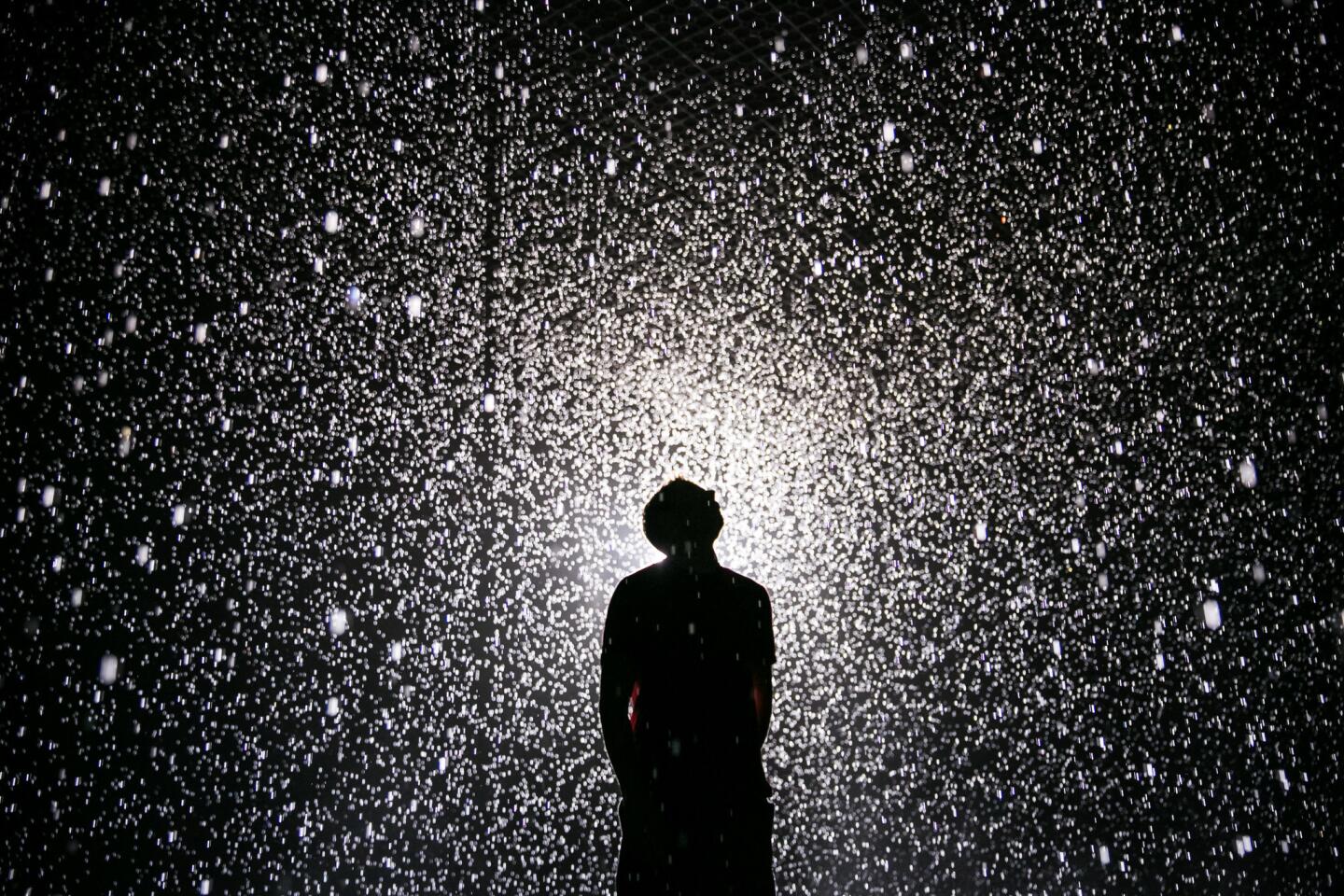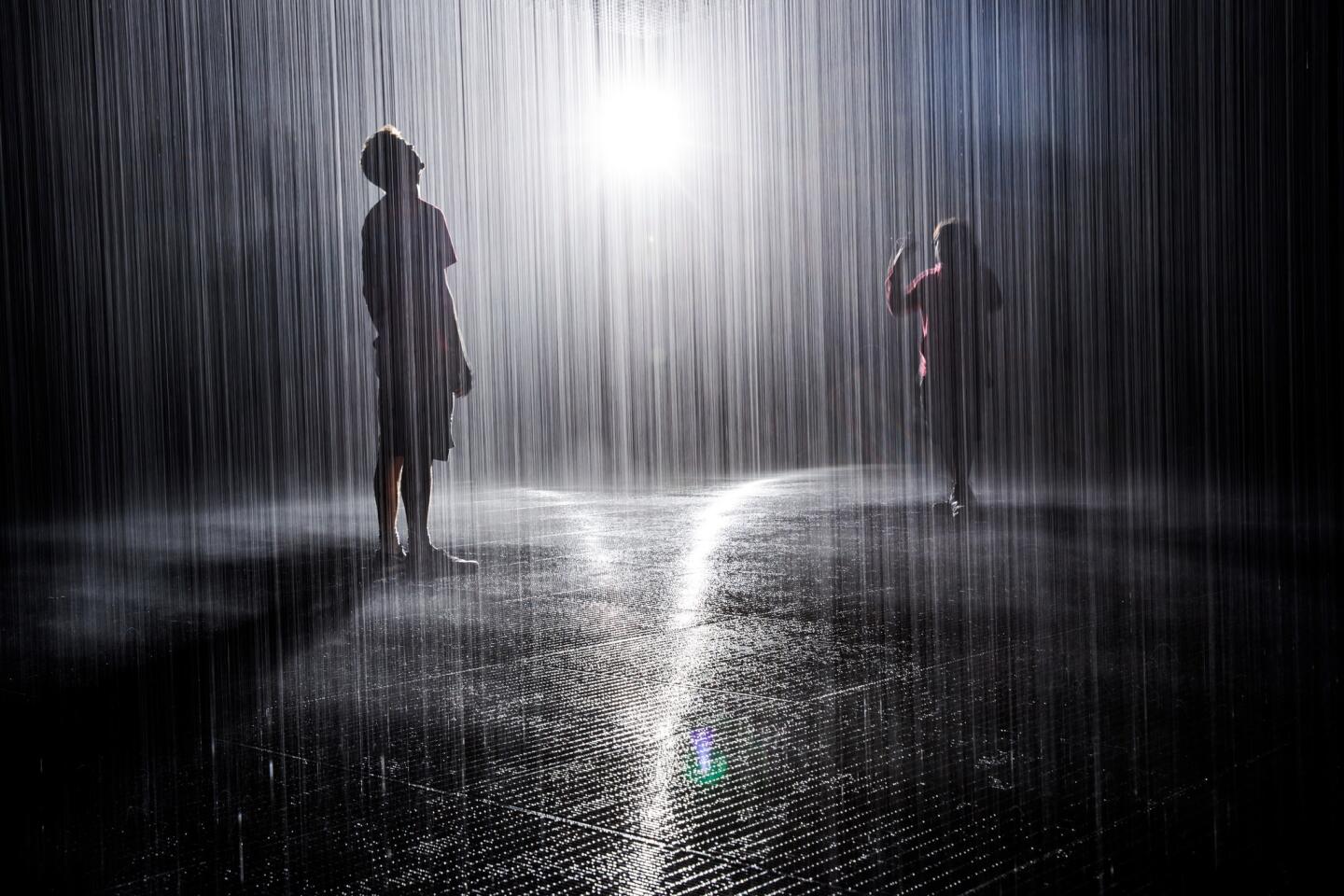Review: âRain Room,â technologyâs hot-ticket riff on Mother Nature
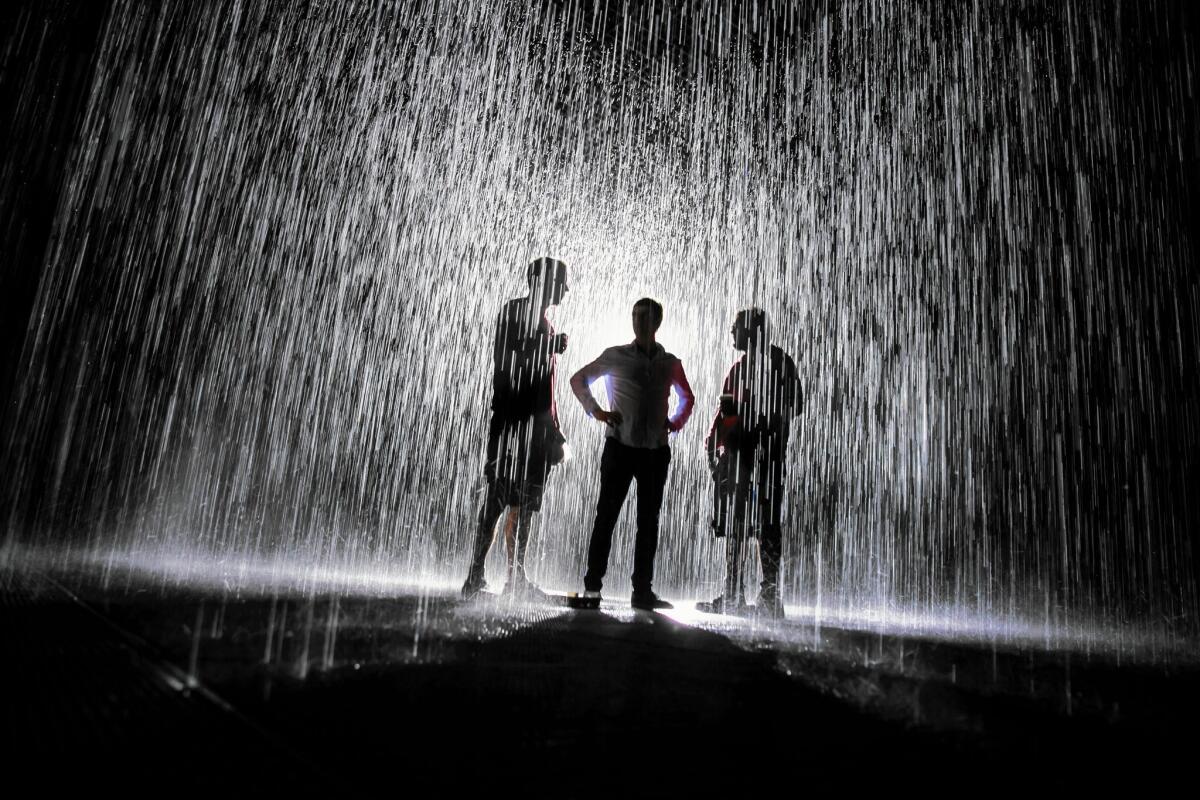
Half the fun of an actual rainstorm is that the deluge is unpredictable, a natural outburst whose duration is unknown and whose force fluctuates according to invisible conditions like wind and temperature. The âcalm before the storm before the calmâ injects a dimension of abstract narrative.
It tends to be messy and unruly.
In âRain Room,â the immersive installation at the Los Angeles County Museum of Art that simulates a heavy downpour, the messiness is all cleaned up â smoothed out, unruffled and neatly organized for your 15 minutes of viewing pleasure. Itâs a Minimalist storm. âRain Roomâ performs plastic surgery on nature.
SIGN UP for the free Essential Arts & Culture newsletter >>
After high-profile stints in London, New York and Shanghai, the installation opened Sunday and runs for three months. The rain shower paradoxically happens indoors, inside a black-box room.
Even more unexpectedly, it keeps people who brave the storm nearly bone-dry as they venture forth into the falling rain.
The special effect, created by the London design company Random International, functions through a computerized system of 3-D tracking cameras, which are placed at intervals around the ceiling. A grid of overhead nozzles lets fat drops of liquid fall to the floor in steady streams, passing through a field of injection molded tiles.
When the cameras pick up a personâs body entering the field, they signal the nozzles directly above it to close. A column of dry air with a roughly 6-foot radius moves with you as you walk slowly through the room.
Letâs stipulate at the outset that âRain Roomâ will be a popular hit. Brainless amusement often is.
This oneâs got everything, starting with the cinematic âOh, wowâ factor that drives all special effects, whether for the superheroes of âThe Avengersâ or the high-wire protagonist of âThe Walk.â Like them, âRain Roomâ is photogenic.
Itâs even selfie-ready, thanks especially to a single bright, white theatrical spotlight that illuminates the falling water from the side. The rain is turned into Swarovski-worthy sparkles of glistening silver.
Video â ideal for broadcast television and eye-catching online media â can further inflate the dramatic action. It frames shadowy, backlighted figures mysteriously moving through glistening space. (Youâve seen pretty much the same shot in a hundred movies, from âA Midsummer Nightâs Dreamâ or âCasablancaâ to âIn Cold Bloodâ or âThe Terminatorâ; now, you get to star.) Videos pump up the publicity factor in ways that few paintings or sculptures ever could.
And âRain Roomâ is exclusive, like a chic nightclub in Hollywood or a reservation-packed restaurant. Anyone can buy a ticket (a $10 or $15 upgrade to a general admission ticket or a Frank Gehry ticket) for 15 minutes inside, although getting that ticket can be tough.
Exclusivity is often a powerful draw. This is appointment art, and appointments book up.
The number of daily visitors must be carefully controlled. Any more than seven people inside at one time, and âRain Roomâ can begin to experience technical difficulties â even to the point of overloaded surveillance cameras signaling to shut down everything.
But looking at glamorous pictures is far more appealing than actually being inside, which turns out to be rather banal. Whatâs this immersive installation like inside? The experience is not so different from being outside looking in.
Watching a downpour is all there is. Standing on the roomâs periphery offers a contemplative experience hardly distinct from being inside the storm. Heightened physical consciousness comes only when you get wet.
Sort of the way it does anytime it really rains. And you will get wet, at least a bit, from errant drops suddenly splashing on your head or sleeve.
This is technology, after all. Just like when your smartphone decides to freeze up or your Wi-Fi unexpectedly drops, the electronic on-off switch controlling the roomâs rain canât necessarily catch every bit of water seeking its own level. Like Windows 8 or Appleâs Lion operating systems, there will be bugs.
A complex computer system hidden offstage controls the action out front. It might be better if they let it all hang out.
The show is presented as the first in LACMAâs Art + Technology partnership, funded by Hyundai Motor Co. and announced in March. It comes with no particular museum curator attached â the first such LACMA exhibition I can recall. That no curator is willing to claim it should give one pause concerning the new projectâs direction.
âRain Roomâ seems a pale and (you should pardon the expression) watered-down riff on âThe Weather Project,â the famous illusion of an enormous, glowing indoor sun with which the compelling Danish-Icelandic artist Olafur Eliasson drew huge crowds to the Turbine Hall of Londonâs Tate Modern a dozen years ago. That was a couple of years before the London-based Random International team got together.
âRain Roomâ is Weather Project 2.0. In design, a related loss of product quality comes when a focus on production shifts to a focus on audience consumption. Except for being a mildly entertaining spectacle, not much of any interest is going on in this bland tempest.
Follow me on Twitter @KnightLAT
More to Read
The biggest entertainment stories
Get our big stories about Hollywood, film, television, music, arts, culture and more right in your inbox as soon as they publish.
You may occasionally receive promotional content from the Los Angeles Times.
